| Listing 1 - 10 of 29 | << page >> |
Sort by
|
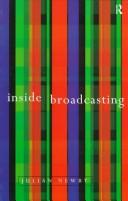
ISBN: 0415151120 0415157714 9780415157711 9780415151122 0203129954 9780203129951 1134746873 1280567139 9786610567133 9781134746828 9781134746866 9781134746873 1134746865 9781280567131 6610567131 Year: 1997 Publisher: London Routledge
Abstract | Keywords | Export | Availability | Bookmark
 Loading...
Loading...Choose an application
- Reference Manager
- EndNote
- RefWorks (Direct export to RefWorks)
Inside Broadcasting provides a comprehensive introduction to a highly rewarding yet competitive industry. It analyses the day-to-day running of both television and radio organisations and examines the jobs involved and how to get them. Inside Broadcasting begins with an informative history of broadcasting in the United Kingdom. It traces the invention of radio and television, from the founding of the BBC and ITV networks through to the end of the terrestrial monopoly and the advent of satellite and pay-per-view television. Julian Newby explains what skills, experience and professional qualifications are required for entry into this profession. He provides detailed job descriptions and explains how each job fits into the industry as a whole. Practical careers advice together with a comprehensive list of training and educational bodies, companies and professional publications ensure Inside Broadcasting is an essential introduction to a career in radio and television.
Broadcasting --- Vocational guidance --- Mass communications --- Great Britain --- Broadcasting industry --- Communication and traffic --- Cultural industries --- Telecommunication

ISBN: 0805848126 0805862110 9786612375804 1282375806 1410617408 1135617147 1135617139 9781410617408 9780805848120 9781135617141 9781135617097 1135617090 9781135617134 9780805862119 Year: 2005 Publisher: Mahwah, N.J. L. Erlbaum Associates
Abstract | Keywords | Export | Availability | Bookmark
 Loading...
Loading...Choose an application
- Reference Manager
- EndNote
- RefWorks (Direct export to RefWorks)
Introduces the concepts and analytical frameworks of strategic and brand management, and illustrates how they can be adapted according to the characteristics of distinct media products. This book provides empirical examinations of broadcast, multichannel media, enhanced television, broadband communications, and global media conglomerate markets.
Brand name products --- Branding (Marketing). --- Broadcasting --- Management. --- Branding (Marketing) --- Broadcasting industry --- Marketing --- Advertising --- Communication and traffic --- Cultural industries --- Telecommunication
Book
ISBN: 1283529599 9786613842046 0773585982 9780773585980 9780773539112 0773539115 0773586385 Year: 2011 Publisher: Montreal ; Ithaca [N.Y.] : McGill-Queen's University Press,
Abstract | Keywords | Export | Availability | Bookmark
 Loading...
Loading...Choose an application
- Reference Manager
- EndNote
- RefWorks (Direct export to RefWorks)
A moving portrait of a Canadian writer and broadcaster that raises questions about how we shape and are shaped by the past.
Authors, Canadian --- Women authors, Canadian --- Women broadcasters --- Broadcasters --- Women in the broadcasting industry --- Canadian women authors --- Gould, Mona,
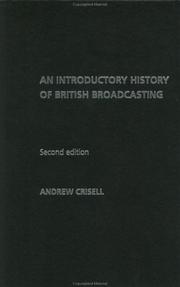
ISBN: 1283642301 1134538065 128011391X 0203995007 0415247918 9780203995006 0415247926 9781134538010 9781134538058 9781134538065 9780415247917 9780415247924 Year: 2012 Publisher: Hoboken : Taylor and Francis,
Abstract | Keywords | Export | Availability | Bookmark
 Loading...
Loading...Choose an application
- Reference Manager
- EndNote
- RefWorks (Direct export to RefWorks)
An Introductory History of British Broadcasting is a concise and accessible history of British radio and television. It begins with the birth of radio at the beginning of the twentieth century and discusses key moments in media history, from the first wireless broadcast in 1920 through to recent developments in digital broadcasting and the internet.Distinguishing broadcasting from other kinds of mass media, and evaluating the way in which audiences have experienced the medium, Andrew Crisell considers the nature and evolution of broadcasting, the growth of broadcasting institution
Broadcasting. --- Broadcasting-- Great Britain-- History. --- History. --- Broadcasting --- Journalism & Communications --- Radio & TV Broadcasting --- History --- Broadcasting industry --- Communication and traffic --- Cultural industries --- Telecommunication

ISBN: 1107175798 9786611146078 0511366876 1281146072 1139131176 0511495293 051136623X 0511365608 0511367465 9780511367465 9780511495298 9780521848978 0521848970 9780521613309 0521613302 9781107175792 6611146075 9780511366871 9781281146076 9781139131179 9780511365607 Year: 2007 Publisher: Cambridge : Cambridge University Press,
Abstract | Keywords | Export | Availability | Bookmark
 Loading...
Loading...Choose an application
- Reference Manager
- EndNote
- RefWorks (Direct export to RefWorks)
European broadcasting policy has attracted attention from many disciplines because it has dual nature: cultural and commercial. This book offers a detailed treatment of European broadcasting law, set against an overview of policy in this area. In this respect the authors identify tensions within the EU polity as regards the appropriate level, purpose and mechanism of broadcast regulation. Key influences are problems of competence, the impact of changing technology and the consequences of increasing commercialisation. Furthermore, the focus of the analysis is on the practical implications of the legal framework on viewers, and the authors distinguish both between citizen and consumer and between the passive and active viewer. The underlying question is the extent to which those most in need of protection by regulation, given the purpose of broadcasting, are adequately protected.
Broadcasting --- Broadcasting policy --- Broadcasting and state --- Mass media policy --- Broadcasting industry --- Communication and traffic --- Cultural industries --- Telecommunication --- Law and legislation --- Government policy --- Law --- General and Others
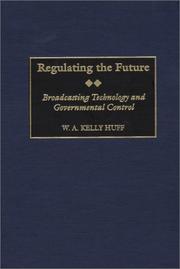
ISBN: 0313314683 0313000603 9780313000607 9780313314681 9798216006695 Year: 2001 Publisher: Westport, Conn. Greenwood Press
Abstract | Keywords | Export | Availability | Bookmark
 Loading...
Loading...Choose an application
- Reference Manager
- EndNote
- RefWorks (Direct export to RefWorks)
Broadcasting -- Political aspects -- United States -- 20th century. --- Broadcasting -- United States -- History -- 20th century. --- Broadcasting --- Transportation Economics --- Radio & TV Broadcasting --- Business & Economics --- Journalism & Communications --- History --- Political aspects --- Broadcasting industry --- Communication and traffic --- Cultural industries --- Telecommunication
Book
ISBN: 1283593319 1920489657 9786613905765 1920489630 1920489002 9781920489656 9781920489007 Year: 2010 Publisher: Rosenbank, South Africa : Open Society Initiative for Southern Africa,
Abstract | Keywords | Export | Availability | Bookmark
 Loading...
Loading...Choose an application
- Reference Manager
- EndNote
- RefWorks (Direct export to RefWorks)
This report on the broadcast media in Nigeria finds that liberalisation efforts in the broadcasting sector have only been partially achieved. More than a decade after military rule, the nation still has not managed to enact media legislation that is in line with continental standards, particularly the Declaration on Freedom of Expression in Africa. The report, part of an 11-country survey of broadcast media in Africa, strongly recommends the transformation of the two state broadcasters into a genuine public broadcaster as an independent legal entity with editorial independence and strong safe...
Public broadcasting --- Broadcasting --- Non-commercial broadcasting --- Noncommercial broadcasting --- Broadcasting industry --- Broadcasting policy --- Government policy --- Nigeria. --- Broadcasting and state --- Mass media policy --- NBC --- National Broadcasting Commission (Nigeria) --- Communication and traffic --- Cultural industries --- Telecommunication --- E-books
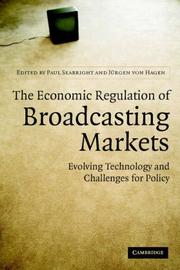
ISBN: 0521696348 9780521696340 9780511611124 9780521874052 052187405X 0511285086 9780511285080 9780511286568 0511286562 0511284268 9780511284267 1107181445 1280909773 9786610909773 0511285841 0511323093 0511611129 Year: 2007 Publisher: Cambridge : Cambridge University Press,
Abstract | Keywords | Export | Availability | Bookmark
 Loading...
Loading...Choose an application
- Reference Manager
- EndNote
- RefWorks (Direct export to RefWorks)
New technology is revolutionizing broadcasting markets. As the cost of bandwidth processing and delivery fall, information-intensive services that once bore little economic relationship to each other are now increasingly related as substitutes or complements. Television, newspapers, telecoms and the internet compete ever more fiercely for audience attention. At the same time, digital encoding makes it possible to charge prices for content that had previously been broadcast for free. This is creating new markets where none existed before. How should public policy respond? Will competition lead to better services, higher quality and more consumer choice - or to a proliferation of low-quality channels? Will it lead to dominance of the market by a few powerful media conglomerates? Using the insights of modern microeconomics, this book provides a state-of-the-art analysis of these and other issues by investigating the power of regulation to shape and control broadcasting markets.
Broadcasting policy. --- Broadcasting --- Economic aspects. --- Law and legislation. --- Broadcasting industry --- Communication and traffic --- Cultural industries --- Telecommunication --- Broadcasting and state --- Mass media policy --- Government policy --- Business, Economy and Management --- Economics
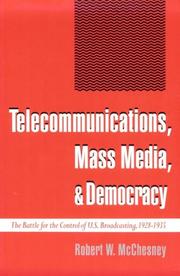
ISBN: 1423740629 0195357531 1602560242 9781423740629 9780195093940 0195093941 9780195071740 0195071743 1280442034 9781280442032 9786610442034 6610442037 019802360X 0197726356 Year: 1994 Publisher: New York Oxford Oxford University Press
Abstract | Keywords | Export | Availability | Bookmark
 Loading...
Loading...Choose an application
- Reference Manager
- EndNote
- RefWorks (Direct export to RefWorks)
This study examines a critical point in US broadcasting, when a strong opposition emerged to challenge network-dominated, advertising-supported media such as radio.
Radio broadcasting policy --- Radio broadcasting --- Radio broadcasting and state --- Broadcasting policy --- History. --- Government policy --- Broadcasting --- Mass media --- #KVHA:Media --- #KVHA:Journalistiek --- #KVHA:Democratie; radio Verenigde Staten --- Broadcasting industry --- Communication and traffic --- Cultural industries --- Telecommunication --- Political aspects --- History --- Radio broadcasting policy.
Book
ISBN: 1283582961 9786613895417 025209235X 9780252092350 9780252034589 0252034589 9780252076930 0252076931 Year: 2009 Publisher: Urbana
Abstract | Keywords | Export | Availability | Bookmark
 Loading...
Loading...Choose an application
- Reference Manager
- EndNote
- RefWorks (Direct export to RefWorks)
Broadcasting policy --- Freedom of expression --- Broadcasting --- Broadcasting and state --- Mass media policy --- Expression, Freedom of --- Free expression --- Liberty of expression --- Civil rights --- Broadcasting industry --- Communication and traffic --- Cultural industries --- Telecommunication --- Law and legislation --- Government policy
| Listing 1 - 10 of 29 | << page >> |
Sort by
|

 Search
Search Feedback
Feedback About UniCat
About UniCat  Help
Help News
News